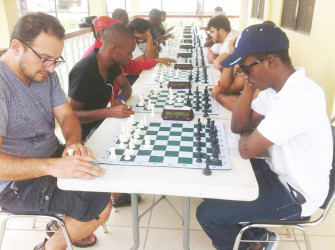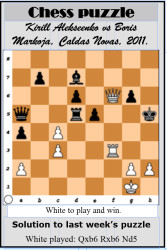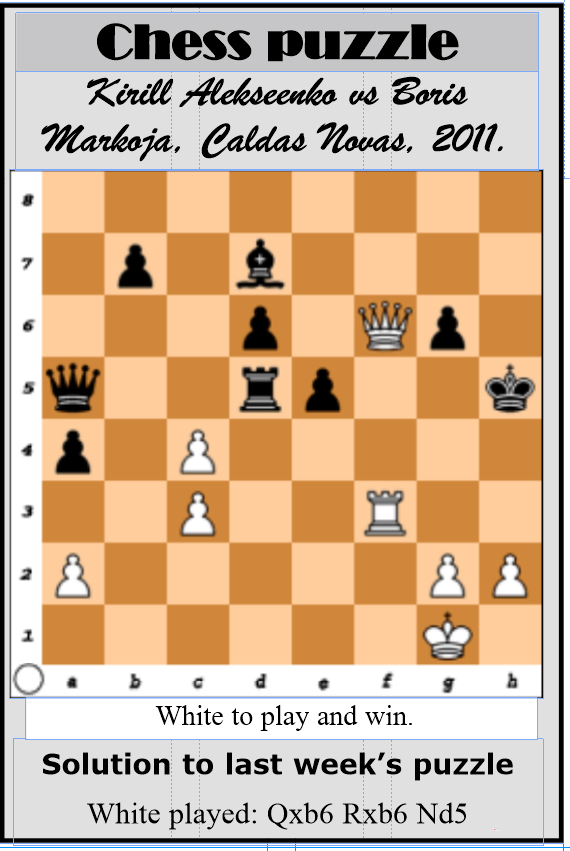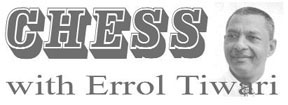The electronic chess competition which will determine a challenger for world champion Magnus Carlsen began on Friday in Moscow. Eight elite grandmasters are participating, with six numbered among the top ten of the universe. The list of participants is:
Hikaru Nakamura, USA – Winner of the 2014-2015 Grand Prix
- Fabiano Caruana, USA – Runner-up of the 2014-2015 Grand Prix
- Sergey Karjakin, Russia – Winner of the 2015 World Cup
- Peter Svidler, Russia – Runner-up of the 2015 World Cup
- Viswanathan Anand, India – Loser of the 2014 World Championship Match
- Veselin Topalov, Bulgaria – Based on his 2015 FIDE rating
- Anish Giri, Netherlands – Based on his 2015 FIDE rating
- Levon Aronian, Armenia – Chosen as a Wild Card entry by FIDE
Readers may also find the FIDE ratings and rank of the competitors as of March 1, 2016 interesting. These are as follows: Caruana, 2794, No 3; Giri, 2793, No 4; Nakamura, 2790, No 6; Aronian, 2786, No 7; Topalov, 2780, No 8; Anand, 2762, No 11; Karjakin, 2760, No 13; Svidler, 2757, No 16. Who, therefore, would win the 2016 Candidates Tournament and earn the right to compete for the world chess championship?

In 2014, the 23-year-old Norwegian grandmaster Magnus Carlsen was the clear favourite to win the Candidates, because he was the highest-rated chess player in the world at the time, higher than Anand, who was then the current world champion. Additionally, Carlsen was winning tournament after tournament, thereby introducing the impression he was created for the role of playing exemplary chess.
So who would succeed in the 2016 Candidates? Assuredly, the tournament is in no way ordinary. Participants will have an equal opportunity to challenge the keeper of the holy grail of chess. Danish chess grandmaster Peter Heine Nielsen is a renowned opening expert who worked with Carlsen when the young grandmaster used the Dragon as one of his favourite weapons against e-4. He was the second (an assistant) of grandmaster Anand when he, Anand, took the world championship title away from Russia’s Vladimir Kramnik. He also worked with Topalov, former FIDE world champion, and world championship contender, Israel’s Boris Gelfand. Recently, he re-commenced working with Carlsen, perhaps in preparation for the world championship title match.
Nielsen aired his views about the Candidates which were largely informative. A cross-section of net users who listened to the interview, also unwrapped their comments. An estimated one billion chess fans have an opinion. Who will it be?
Nielsen’s comments
Anand – Dark Horse: Anand is a spectacular chess player, capable of fighting all the way to the finish line. The bookies give him odds at 50-1. The tournament is not a sprint and although Anand is currently in a slump, his previous experience at the world championship level can be an invigorating factor, limited by his age, at 46. Analysts feel his time has passed.
Aronian: Gained entry through the organizer’s Wild Card. Expectations low. Had a long slump. But that can work out to his advantage. Going to be very well prepared. Tends to be nervous. He won at St Louis in the Grand Chess Tour and would feel that after so many failures, his time has arrived. Hard worker.
Giri – Extremely solid: This could work to his advantage, or disadvantage. Needs someone to push him. To win the Candidates, one has to obtain a plus-4 score and draws will do him no good. Giri would be well prepared. If he gets off to a good start and gets someone to push him, he can do very well. Needs a bit of luck. One of the bookmakers’ favourites.
Nakamura – Bookmakers’ absolute favourite, but not by much. Nielsen’s favourite also to win: Would be adequately prepared. Has little experience at this level. Able to shift openings when necessary. Not considered world championship material. Perform-ed disappointingly in the Grand Chess Tour. Serious professional player.
Topalov – Least likely to win the tournament: Comes over as the player from whom fellow participants would believe they can take a game. Has not done well under this kind of pressure.
Caruana – In decent shape: First time he will play for stakes this high. If you go a year back, he would be the favourite.

Svidler: Has enormous chess talent. Will view the tournament as having nothing to lose. Has never been seen as a serious contender for first place. But this has changed. Svidler has a chance. Like Giri, someone had to push him, but not anymore. You can expect the best from him.
In summary, it is clear one cannot predict an absolute winner. My educated guess would be Caruana. But what if you could enter everything you know about the players and allow the computer to choose a winner? Not just their ratings and recent results, but their playing tendencies and other features associated with chess. Two computer experts did just that with millions of simulations and obtained an answer.
The computer picked Caruana. The order was Caruana, Nakamura, Giri, Aronian, Topalov, Anand, Karjakin and Svidler. The winning probabilities ranged from 19 per cent for Caruana to 5.8 per cent for Svidler. Less than a margin of two per cent separated Caruana and Nakamura, the two US grandmasters.
Chess games
The following games were played at the Women’s World Chess Championship between Mariya Muzychuk and Hou Yifan. The Championship ends on March 18. After five games, Yifan is leading with a single win.
White: Mariya Muzychuk
Black: Yifan Hou
1.e4 e5 2.Nf3 Nc6 3.Bc4 Bc5 4.O-O Nf6 5.d3 O-O 6.c3 d6 7.h3 h6 8.Re1 a6 9.a4 Ba7 10.Nbd2 Re8 11.Nf1 Be6 12.Bxe6 Rxe6 13.Be3 Bxe3 14.Nxe3 d5 15.Qc2 Qd7 16.Rad1 Rd8 17.Nf5 Qe8 18.b4 b5 19.axb5 axb5 20.Nd2 Ne7 21.Nxe7+ Qxe7 22.Nb3 dxe4 23.dxe4 Red6 24.Nc5 Rxd1 25.Rxd1 Rxd1+ 26.Qxd1 Qd6 27.Qe2 c6 28.g3 Nd7 29.Nxd7 Qxd7 30.Kg2 Qd6 31.Qe3 1/2-1/2.
White: Yifan Hou
Black: Mariya Muzychuk
1.e4 e5 2.Nf3 Nc6 3.Bb5 a6 4.Ba4 Nf6 5.O-O Nxe4 6.d4 b5 7.Bb3 d5 8.dxe5 Be6 9.Be3 Be7 10.c3 O-O 11.Nbd2 Qd7 12.Bc2 Nxd2 13.Qxd2 Bg4 14.Bf4 Bxf3 15.gxf3 Rad8 16.Rfd1 Qe6 17.Qe3 Rd7 18.Bg3 g6 19.a4 Nd8 20.axb5 axb5 21.f4 f6 22.exf6 Qxf6 23.Qe2 c6 24.Qg4 Rb7 25.f5 Bd6 26.Ra6 Rg7 27.fxg6 Bc5 28.Kg2 hxg6 29.Rxd5 Bxf2 30.Bb3 Ne6 31.Rd6 Bc5 32.Qxe6+ 1-0.
White: Mariya Muzychuk
Black: Yifan Hou
1.d4 Nf6 2.c4 e6 3.g3 d5 4.Bg2 Bb4+ 5.Bd2 Be7 6.Nf3 O-O 7.O-O Nbd7 8.Qc2 c6 9.Rd1 b6 10.Bf4 Ba6 11.cxd5 cxd5 12.Ne5 Rc8 13.Nc6 Bb5 14.Nxe7+ Qxe7 15.Nc3 Nh5 16.Be3 Nhf6 17.a4 Bc4 18.a5 bxa5 19.Rxa5 Qb4 20.Rda1 Rb8 21.Rxa7 Qxb2 22.Qxb2 Rxb2 23.Bf3 h6 24.h4 Rc8 25.Bf4 Rc2 26.R7a3 h5 27.Kg2 Kh7 28.Rc1 Rxc1 29.Bxc1 e5 30.dxe5 Nxe5 31.Be3 Nxf3 32.Kxf3 Ne4 33.Nxe4 dxe4+ 34.Kxe4 Bxe2 35.Ra5 f6 36.Rc5 Rxc5 1/2-1/2.
White: Yifan Hou
Black: Mariya Muzychuk
1.e4 e5 2.Nf3 Nc6 3.Bb5 a6 4.Ba4 Nf6 5.O-O Nxe4 6.d4 b5 7.Bb3 d5 8.dxe5 Be6 9.c3 Be7 10.Bc2 Bg4 11.h3 Bh5 12.g4 Bg6 13.Nd4 Nxd4 14.cxd4 h5 15.f3 Ng3 16.Rf2 hxg4 17.Bxg6 Rxh3 18.Qc2 Bc5 19.Qxc5 Rh1+ 20.Kg2 Rh2+ 21.Kg1 Rh1+ 1/2-1/2.






